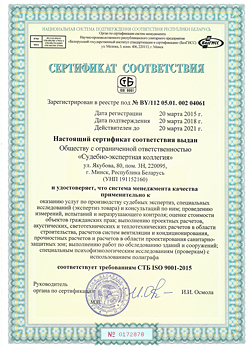The Forensic expert kollegium carries out expertise of all types of refrigeration equipment.
Refrigeration equipment is designed to automatically maintain temperature and other air parameters (relative humidity, cleanliness, air velocity) in closed rooms, as well as to maintain the required parameters for long-term storage of food and other purposes.
Depending on the purpose, the following groups of refrigeration equipment are distinguished:
- industrial (refrigerating and freezing chambers, refrigerating chamber doors, compressor refrigerating units, refrigerating machines, air coolers and air condensers, compressor refrigerating units);
- trade (prefabricated refrigerating chambers, refrigerated cabinets, refrigerated display cases, counters and showcases);
- household (household refrigerators, special freezers).
Any refrigeration equipment consists of the following minimum required components:
- compressor;
- capacitor;
- thermostatic fan (TRV);
- evaporator.
Failure of any of the above units makes the operation of refrigeration equipment impossible.
Based on the analysis of the expert practice of the Forensic expert kollegium, the following defects (malfunctions) are most often revealed during the inspection of refrigeration equipment:
- compressor failure (spontaneous compressor shutdown);
- loss of oil during compressor operation;
- low equipment performance (does not produce enough cold for the room);
- freezing or ice coating of the evaporator;
- low discharge pressure;
- failure of the automation system (spontaneous triggering of the high / low pressure switch);
- absence of set outlet temperature.
The reasons for the malfunctioning of refrigeration equipment are different in each particular case, however, quite common ones can be distinguished:
- excess or lack of refrigerants in the system;
- failure in the operation of the electric motor (there was a burnout of the rotor winding, stator, oxidation of the feed box contacts, destruction of bearings, etc.);
- valve malfunction;
- clogging of filters, system evaporators;
- failure of the evaporator fan;
- the operating temperature of the refrigeration equipment in the room is below / above the operating temperature.
In the event of a refrigeration equipment failure, when it becomes necessary to disassemble the device, it is recommended to carry out all operations directly in the presence of the commission (representatives of the service organization, seller, consumer) and drawing up a defect detection report.
In the case of initial diagnostics (disassembly) of refrigeration equipment without the presence of experts of the Forensic expert kollegium, it is advisable to note such important factors as the state of the refrigerant, the presence of oil, ice, etc. Most often, minor traces help to establish the reliable cause of the installation malfunction and determine the nature of the defect (malfunction), therefore, during the disassembly process, it is advisable to take a detailed photograph of the process.
During independent expertise of refrigeration equipment at the Forensic expert kollegium, as a rule, the following questions are raised:
- Does the refrigeration equipment... (the manufacturer, model, serial number are indicated) have (the malfunction that will be checked, for example: automation systems, compressor, etc.) defects or shortcomings in operation?
- What is the reason for the emergency stop (failure) of the (the manufacturer, model, serial number are indicated) equipment?
- Are there any traces of violation of the operating rules in the refrigeration equipment or traces of a production nature of occurrence?
While carrying out expertise of refrigeration equipment at the Forensic expert kollegium, in order to resolve the above issues, it is necessary to provide all of the available documentation: design, technological and operational documentation; commissioning certificates, complaints, defect detection reports, etc.
You can consult on the diagnostics and expertise of refrigeration equipment at the Forensic expert kollegium at: Minsk, Zhukovskogo st., 11A, 4th floor.
or by phone: +375 (17) 317 04 71; +375 (17) 317 04 72; +375 (17) 317 04 73; +375 (17) 317 04 74; +375 (17) 317 04 76; +375 (44) 588 60 11; +375 (44) 786 60 11




















